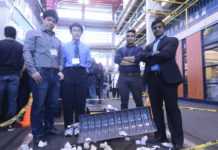When the Ford government announced changes to OSAP in Jan., students across Canada were horrified.
Over the last month, there have been numerous protests in Ontario against the changes, including a province-wide demonstration Feb 4. For UW and Laurier, this protest was in the Laurier Quad, with around 25 protestors and others joining and leaving the group. MPPs Catherine Fife and Laura May Lindel showed their solidarity with university students, and bring awareness to the consequences government’s decisions.
“We want to believe that this is just one change but, all of the changes that are rolling out, now you’re starting to see this bigger pattern,” Lindel said. “I think that the more domestic students know that their tuition decrease is going to be on the backs of international students, on the backs of students from lower income, is the more that they’re going to come out and fight against this supposed benefit. It’s kind of a really clear example of living a life of privilege.”
Ethan Candler, a fourth year Kinesiology student at UW and Advocacy Director for UW RAISE was one of the coordinators of the protest and said the loss of the grace period, cutbacks on grant funding, and other changes will affect already-marginalized groups more.
“The Ford government does not take into account the disproportionate impacts that these will have on particularly marginalized groups,” Candler said. “These sorts of groups that are already burdened by different systemic issues in society, having their educations stripped from them and having their ability to become educated in a way that is almost necessary to become successful in today’s society, and having that treated as a luxury is furthering the marginalization that is already existing within our society on these particular groups.”
“I think [the changes are] going to actually enforce and perpetuate a cycle of poverty and that’s very troubling,” Lindel said.
Although international students do not receive OSAP, changes to tuition and fee structures still affect them. Lindel also noted that when domestic students’ tuition is decreased, international students see an increase in their tuition fees to minimize the difference in revenue for the university.
Lindel believes it is important for students to advocate for themselves and for international students to the provincial government. She recommends students get involved and contact their MPPs directly.
“If you are in a position to be able to mobilize that and to talk back, speak truth to power and talk back to the system, then that’s the kind of thing that you can do. Showing up in these spaces when there’s protests happening, [write] to your MPPs, [sign] our petitions, … we’ve got tools. I think the ultimate goal is to use them,” she said.
Candler also urges students to get involved in local and provincial initiatives against the changes, and other policies that the Ford government has made.
“My primary message for people is just get involved in your community. Canada is characteristically politically apathetic, and so taking part in certain political and democratic functions that we hear about on the news but most people don’t go through with can play a big part,” he said.
“To me, these OSAP changes show how little of a priority the Ford government is making students … Because Ford and the PC government has been continually attacking the different systems in this province that provide the services that students and citizens need to thrive and exist and do well, there is going to be no shortages of actions and political movements against Ford,” Candler said. “These cuts and these frameworks basically just tell me that Ford does not give a f**k about students.”






























